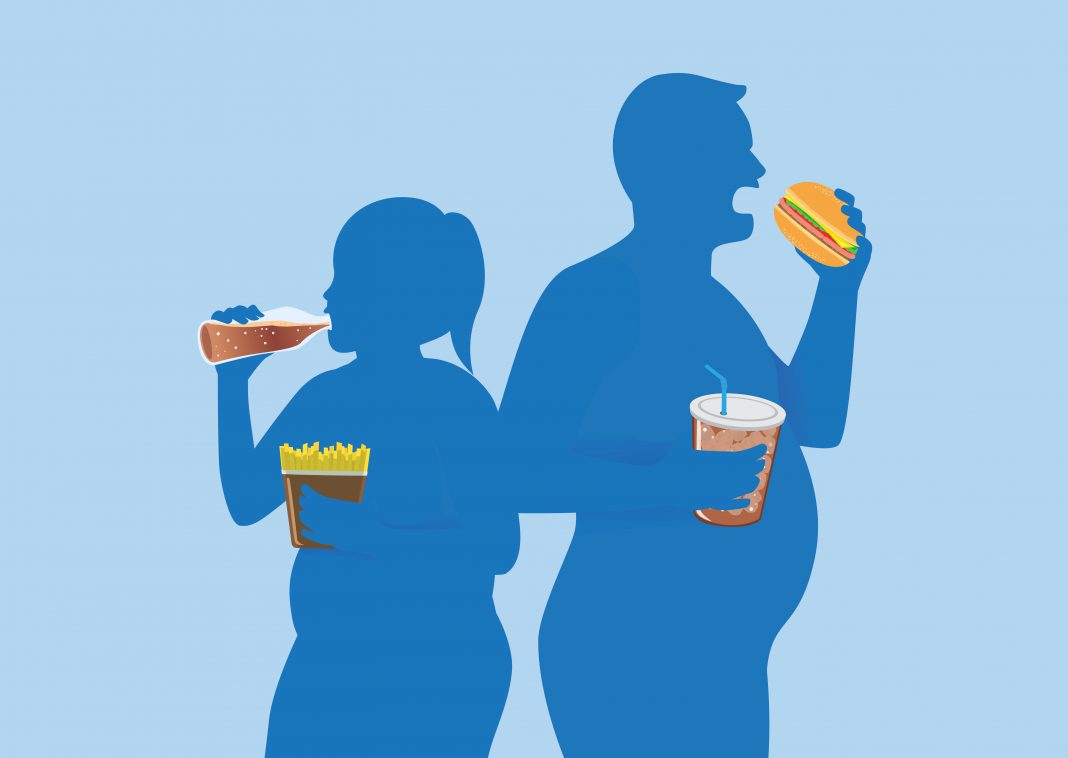Signaling between the gut and the brain controls how much we eat, but the mechanisms involved, and the impact of fat- and carbohydrate-laden western diets (WD) on these signaling pathways and on obesity aren’t known. Studies by scientists at the University of California, Riverside (UCR), have now shown that in diet-induced obesity (DOI), overactive endocannabinoid (eCB) signaling in the intestine blocks the release of a gut-brain satiation signaling peptide called cholecystokinin (CCK), which then promotes overeating.
The discovery could potentially lead to the development of anti-obesity drugs that specifically target peripheral cannabinoid CB1 receptors (CB1Rs) in the gut, and which don’t result in the serious psychiatric side-effects caused by centrally acting CB1Rs antagonists such as rimonabant, which was withdrawn from its approved markets in 2008. “If drugs could be developed to target these cannabinoid receptors so that the release of satiation peptides is not inhibited during excessive eating, we would be a step closer to addressing the prevalence of obesity that affects millions of people in the country and around the world,” said Nicholas V. DiPatrizio, PhD, an assistant professor of biomedical sciences in the UCR School of Medicine, who led the research. DiPatrizio and colleagues report their findings in Frontiers in Physiology, in a paper titled, “Cannabinoid CB1 receptors inhibit gut-brain satiation signaling in diet-induced obesity.”
Studies in both rodents and humans have implicated the endocannabinoid system in the gut-brain signaling pathways that control food intake, and which are dysregulated in obesity, the authors wrote. eCB signaling is effected through the cannabinoid receptor subtypes 1 and 2, CB1R and CB2R. Using drugs that inhibit CB1Rs in the brain hasn’t proved feasible as an anti-obesity approach because of the psychiatric side effects that they cause. In contrast, the authors continued, “CB1Rs antagonists that are restricted to the periphery and do not readily cross the blood-brain barrier are associated with improvements in a variety of metabolic parameters in rodents, and may be an effective anti-obesity strategy that is devoid of psychiatric side-effects inherent to brain-permeable drugs.”

Studies in rodents have in addition demonstrated that using drugs to block increased eCB signaling specifically at CB1Rs in the small intestine blocks refeeding after fasting, and inhibits overeating associated with DIO. “These studies suggest that the eCB system in the small-intestinal epithelium plays a key role in feeding behavior and energy balance, and becomes dysregulated in DIO,” the authors further commented. However, the mechanisms underpinning eCB control of gut-brain signaling and its dysregulation aren’t understood.
Cells in the lining of the small intestine can sense dietary components such as fats, and stimulate the release of satiation peptides including CCK, which controls how much is eaten, and satiation, by signaling to the nervous system. The UCR team used a diet-induced obesity mouse model to investigate whether CB1Rs in the small-intestine epithelium might control feeding indirectly, by blocking the release of such gut-derived satiation peptides, and so taking the brakes off overeating.
They found high endocannabinoid activity at the CB1Rs receptors in the small intestines of animals fed a western diet for 60 days. This eCB overactivity blocked food-induced release of CCK, resulting in the animals overeating. Interestingly, plasma levels of CCK did increase when lean mice that were fed a standard diet were also given a dose of corn oil. This increase in CCK release was blocked in non-obese, corn oil-fed animals that were treated peripherally using a general cannabinoid receptor blocker.
Further tests in the western diet- and standard diet-fed animals indicated that activation of CB1Rs in the upper small intestinal epithelium inhibited nutrient-induced CCK secretion. Interestingly, western diet-fed animals that were treated using the CB1Rs-selective antagonist AM6545 ate less, whereas the same compound had no effect on meal size in animals fed a normal, standard diet. “Importantly, co-administration of a low dose of the CCKA receptor antagonist, devazepide, in WD mice blocked the effects of AM6545 on reducing meal size,” the scientists noted. “These data suggest that the acute anorexic effects of AM6545 in WD mice are dependent on a mechanism that includes activation of CCKA receptors and inhibition of gut-brain satiation signaling.”
The team concluded that their findings point to a mechanism by which eCB activity at CB1Rs in the upper small intestinal epithelium is upregulated in mice chronically fed a WD, which then promotes overeating through a mechanism by which inhibited release of satiation peptides such as CCK disrupts normal nutrient-induced gut-brain satiation signaling. “Collectively, our studies identify a previously unknown role for the eCB system at the interface of nutrient-sensing and gut-brain satiation signaling that becomes dysregulated in DIO and promotes overeating by delaying satiation.”
The discoveries could point to new therapeutic approaches to obesity. “Pharmacological manipulation of these pathways in the periphery may provide a therapeutic advantage for the treatment of obesity and related metabolic disorders when compared with anti-obesity drugs that interact with the brain and display psychiatric side-effects,” the authors noted. They do acknowledge that even though selective drugs would only act on peripheral CB1Rs, it’s not known whether they may still impact on cognition and brain function by altering gut microbe activity.
“We would also like to get a better understanding of how specific components of the Western diet—fat and sucrose—lead to the dysregulation of the endocannabinoid system and gut-brain signaling,” DiPatrizio said. “We also plan to study how endocannabinoids control the release of other molecules in the intestine that influence metabolism.”






